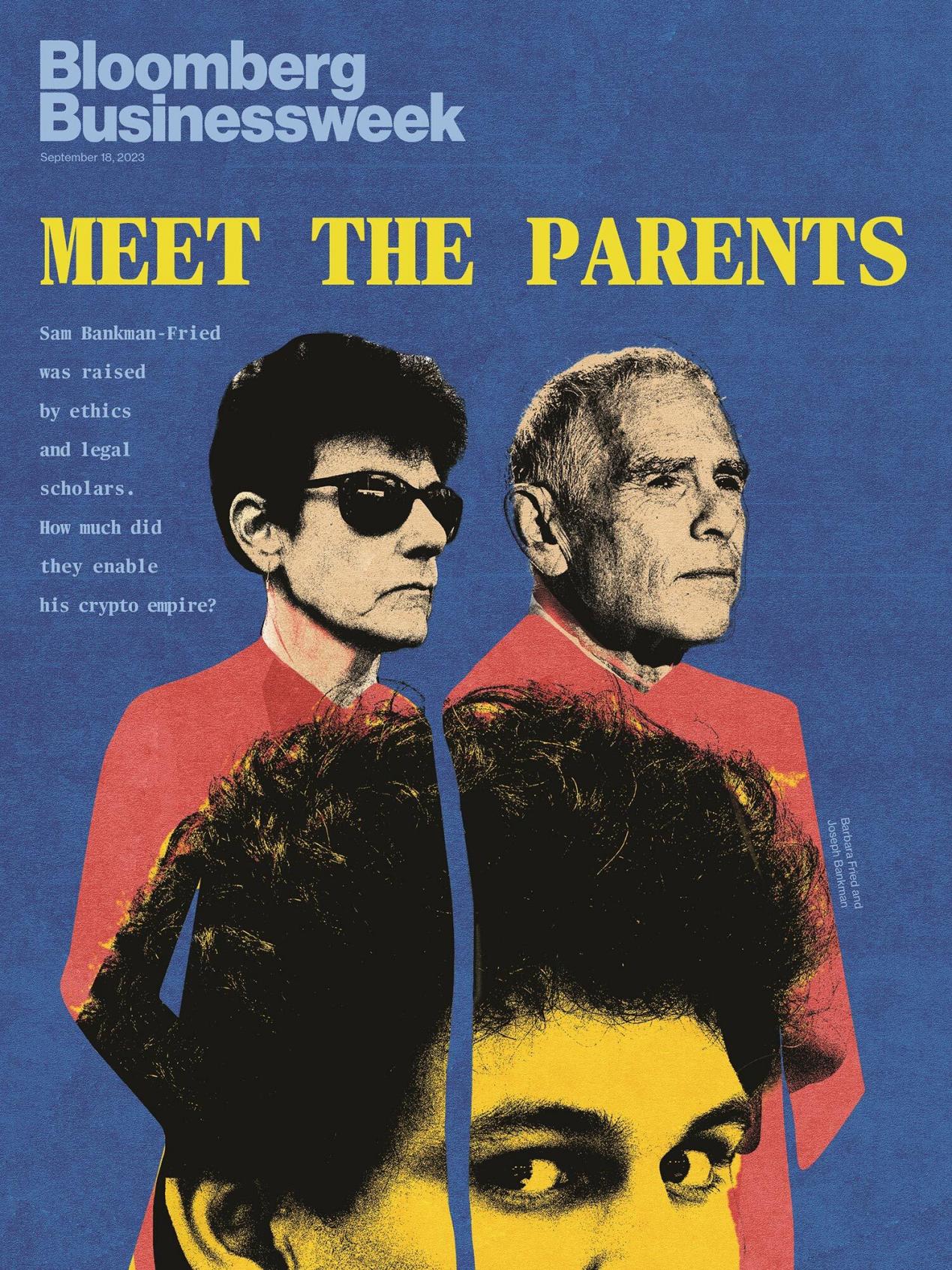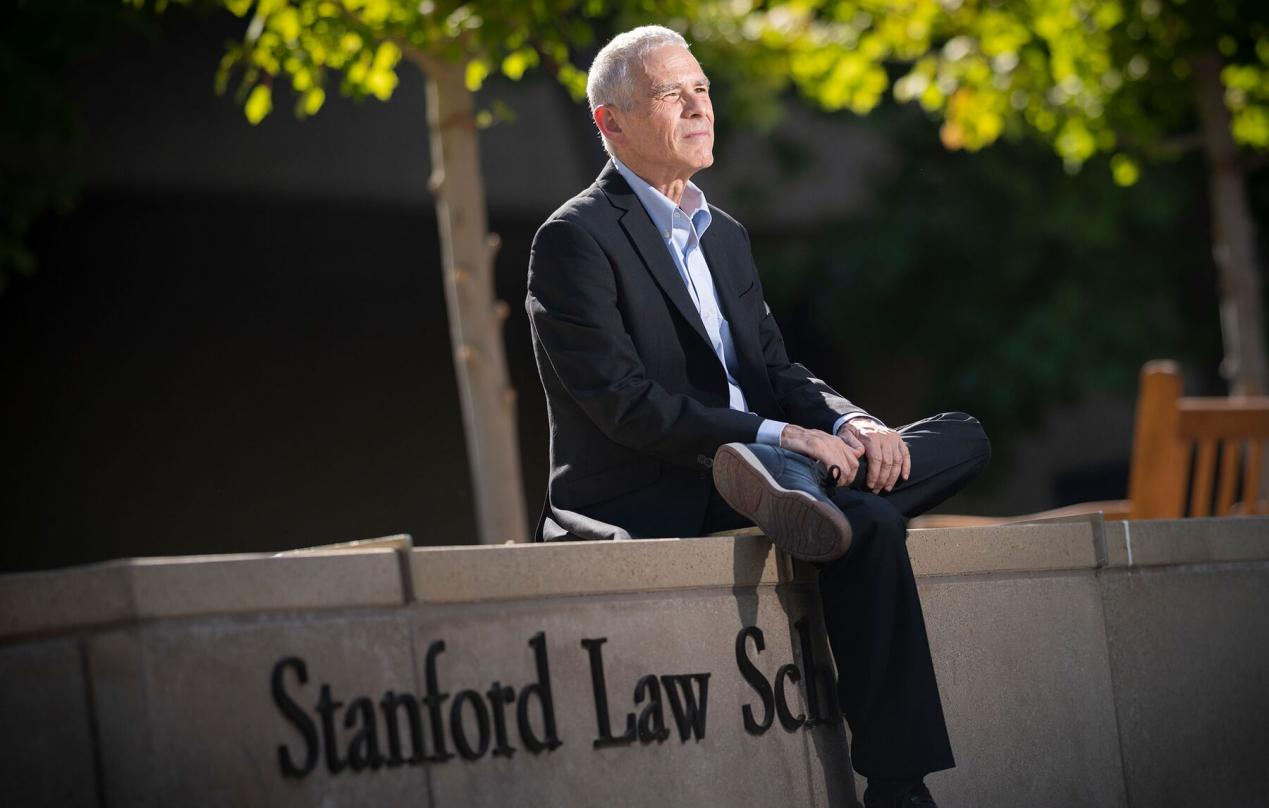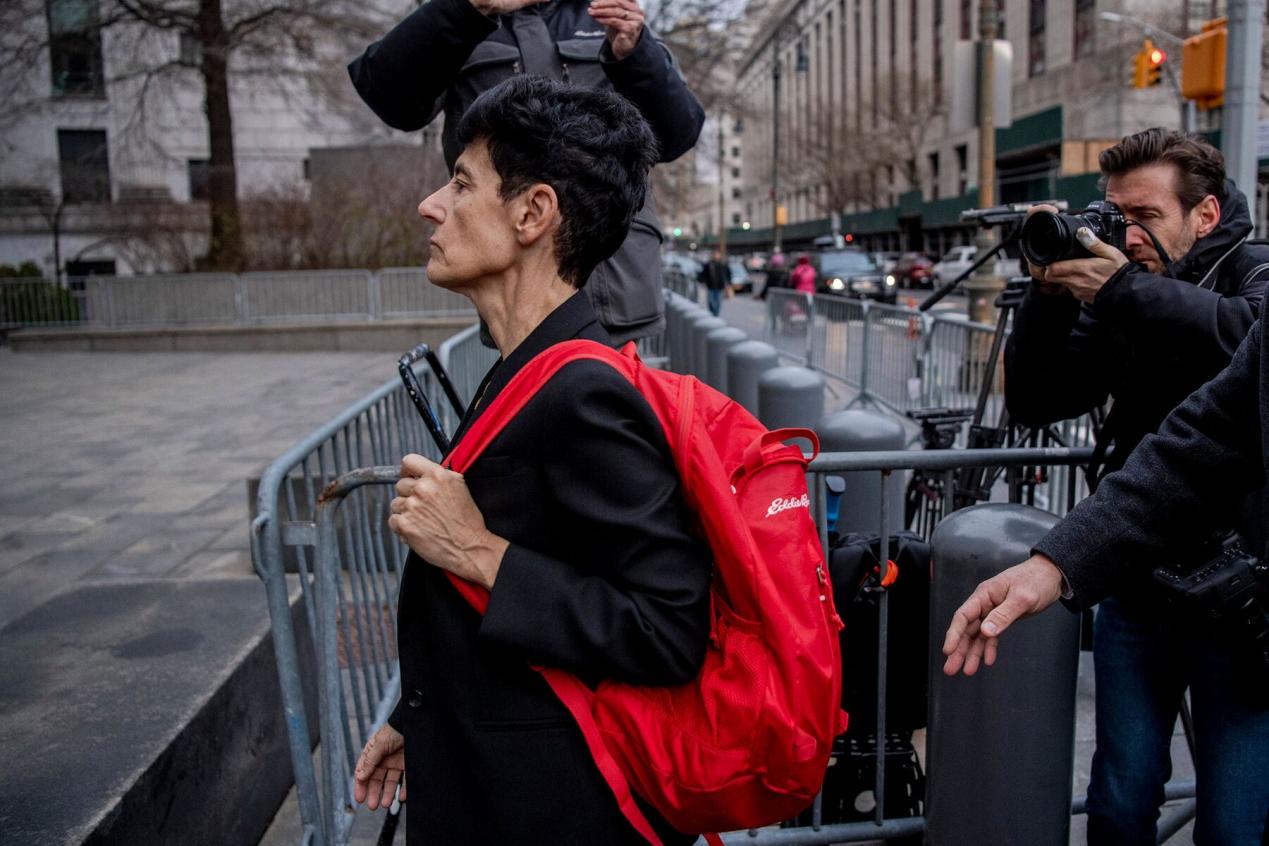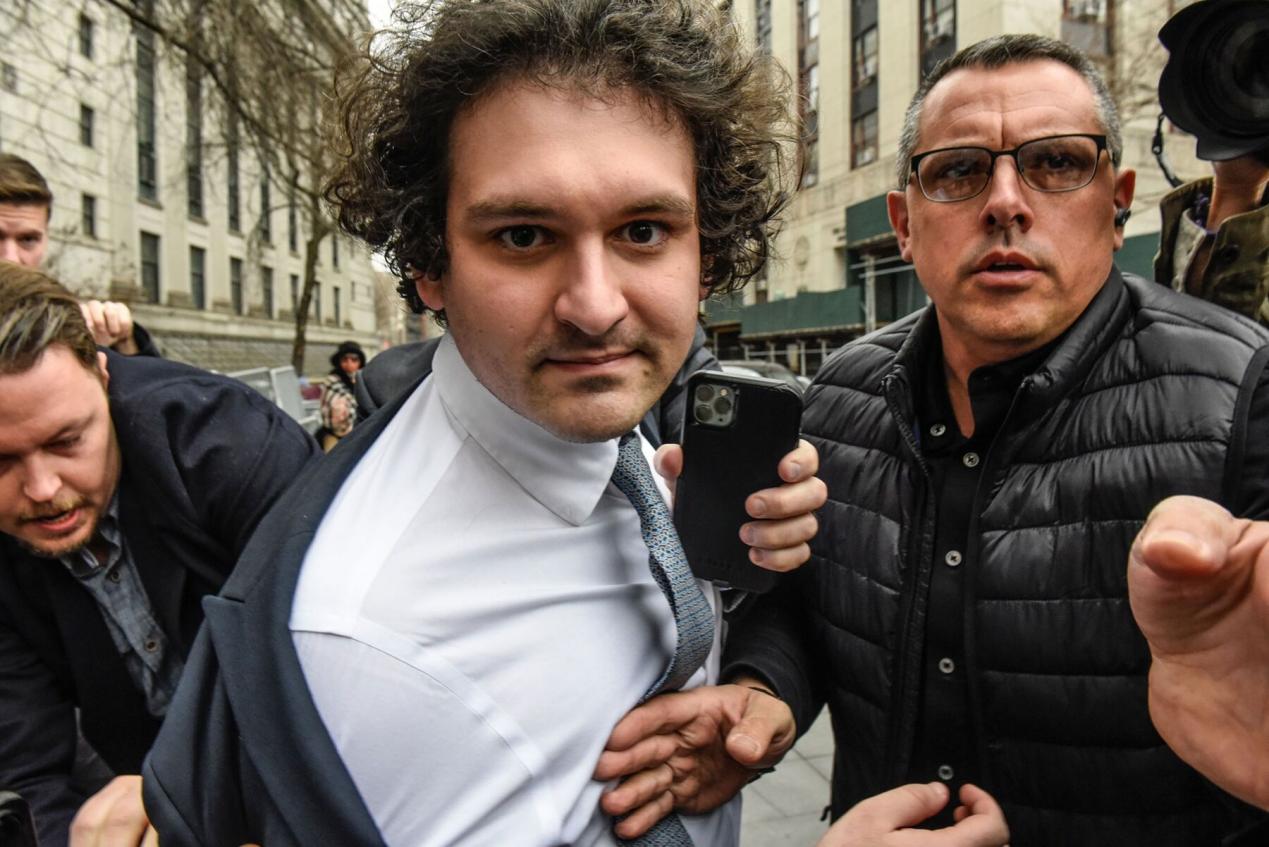Authors: Max Chafkin & Hannah Miller, Bloomberg
Translation: Felix & Joy, PANews
In the home of Sam Bankman-Fried (SBF), Larry David _(Note: _American comedian_) is a family favorite. So when his parents received an email from their son Sam, their excitement was understandable. SBF wrote that his company FTX would air an ad during the 2022 Super Bowl, with David starring in it.
The cantankerous comedian has historically played a series of skeptics, essentially a version of David from the HBO show "Curb Your Enthusiasm" in the Neolithic and Elizabethan eras (Note: "Curb Your Enthusiasm" is a comedy created and performed by Larry David, based on his life in the Los Angeles entertainment industry). The video will feature an invention—wheel, light bulb, Walkman, and finally FTX. And David will repeatedly reject each invention. The ad will warn viewers that if they don't invest in cryptocurrency, they will miss a historic opportunity to get rich. The slogan is "Don't be like Larry."
SBF's parents loved it. "Surreal," SBF's mother Barbara Fried wrote. SBF's father Joseph Bankman expressed how happy and proud he was. A few days later, employees received additional feedback from Sam's brother Gabe. He asked his father if he could play a role in the ad, saying his father was too modest to ask himself. In a sense, the request was odd. At the time, Joseph Bankman did not have a formal role at FTX, nor did Gabe. Gabe ran a non-profit organization supported by FTX, dedicated to preventing epidemics.
Shortly thereafter, Joseph Bankman appeared on set, filming a scene where David strongly opposes the "Declaration of Independence." When told "the people should have the right to vote," David incredulously responds, "Even the stupid ones?" Joseph Bankman, wearing a powdered wig, shouts, "Yes!" FTX spent about $20 million to produce and air this 60-second ad. Around the same time, Joseph Bankman joined the company as an employee.

Screenshot of the FTX Super Bowl ad featuring Larry David. Source: YouTube
A person familiar with the ad production said that in FTX's topsy-turvy logic, the decision to have the boss's father play a role was meaningful. Like most people interviewed for this story, the source requested anonymity to avoid being associated with the chaotic bankruptcies, numerous class-action lawsuits, and several criminal cases. In a sense, Joseph Bankman was a founder of the company.
Both parents had distinguished careers long before their son was accused of fraud. They met at Stanford University in the 1980s and taught at the law school for over thirty years, living on campus and raising two sons. Joseph Bankman was a tax expert known for his efforts to make U.S. tax law more friendly to low-income citizens. Barbara Fried was an authority on legal ethics, highly regarded in progressive political circles.
When the ad aired, critics warned that FTX was using highly risky financial instruments to attract uninformed investors, instruments that are largely banned in the U.S. When these funds were unknowingly transferred to a hedge fund owned by SBF, the money disappeared. FTX filed for bankruptcy in November 2022.

Bloomberg Businessweek cover
Leading the FTX bankruptcy proceedings is John Ray III, who previously oversaw the Enron bankruptcy, but he called this case worse. SBF is accused of using customer funds for personal gain, as well as for his family and other insiders, and is seeking to recover some of the funds. More ominously for SBF, there is a criminal case set to begin in New York City on October 2. Prosecutors have not charged SBF's parents with any wrongdoing, but SBF faces charges including fraud, money laundering, and bribery, with an estimated net worth of $26 billion at the peak of his success. This case could potentially see SBF spending the rest of his life in prison. However, he has not pleaded guilty and has attributed the losses to mismanagement, not criminal activity.
Joseph Bankman and Barbara Fried have largely avoided scrutiny around FTX, at least in part because they have not fully explained their roles in helping their son build a vast business and political influence empire. Instead, they have been portrayed as spectators, often tearfully providing emotional support for their son as he appeared in court frequently. But their names are almost certain to come up during the trial. The defense team has indicated that their strategy may partly depend on advice received from lawyers, including his parents.
The couple's spokesperson, Risa Heller, declined to make Joseph Bankman and Barbara Fried available for interviews. Heller had previously stated that aside from being supportive parents, the two had little involvement with FTX. Heller said that Barbara Fried had never worked at the company, and Joseph Bankman's brief tenure was primarily focused on charitable work. Last year, SBF told The New York Times that his parents "had no involvement in any relevant part of his company."
Former employees and business partners say their impression at the time was different, and legal filings show that Joseph Bankman and Barbara Fried were crucial to their son's transformation from a clumsy startup guy to a cryptocurrency tycoon. The couple made substantial profits from FTX, netting $26 million in cash and real estate in 2022 alone. They were regulars at the company's offices, boosting morale among employees and being included in internal communications. Their reputation and connections were crucial to FTX's success.
As one of FTX's largest investors, Sequoia Capital published a complimentary article stating that their child seemed "born for the role of founder and CEO of a cryptocurrency exchange." The article attempts to explain why one of Silicon Valley's most respected venture capital firms chose to provide $150 million to a young man who played computer games at an investor pitch, and provides two pieces of evidence to support its claim. First, SBF briefly worked at a Wall Street trading firm. Second, his parents were law professors at Stanford University.
In Silicon Valley, no one wants to think of themselves as privileged. Venture capital firms and entrepreneurs who read Ayn Rand often get angry at the suggestion that their decisions are not based on calculated reasoning. However, the reflexive elitism in Silicon Valley is so apparent that it goes without saying. The vast majority of investors favor companies run by white people, whose founders usually come from a small group of elite universities, while avoiding anyone who deviates from their shallow understanding of what successful founders should look, talk, and act like. Some openly discriminate against entrepreneurs over 30, those with accents, and anyone who behaves as if they are not already wealthy.
In this extremely privileged world, the most privileged place is Stanford University—the birthplace of companies like HP, Sun Microsystems, Cisco, Yahoo, Google, and PayPal. Barbara Fried has a background from Harvard University, Harvard Law School, the U.S. Court of Appeals for the Second Circuit, and Paul, Weiss law firm. In 1987, Barbara Fried arrived at Harvard as a tenured professor and rented a house on campus. A year later, she met Joseph Bankman. Joseph Bankman graduated from the University of California, Berkeley and Yale Law School, and after working as a tax lawyer in Los Angeles, came to Stanford to teach trial advocacy. After Joseph Bankman received tenure in his second year, Barbara and Joseph (as they were known on campus) publicly acknowledged their relationship. They moved in together, and in 1991, when Barbara Fried's rented house was sold, they bought it.

Bankman and Fried's home on the Stanford University campus.
SBF grew up in a house that also served as his place of "soft detention" in the first half of 2023, located at the end of Cooksey Lane. It is valued at $3.6 million, but this is more a result of Palo Alto's real estate boom over the decades than a judgment of its luxury. The house is a fairly ordinary gray Craftsman building with four bedrooms, three bathrooms, a spacious porch, and a swimming pool, situated on a large plot of land surrounded by towering trees. Behind the property is the Lou Henry Hoover House, a modernist building that was once the home of former President Herbert Hoover and is now the residence of the president of Stanford University.
During SBF's childhood, the surrounding area was filled with a group of young intellectuals—law professors and law students, of course, but also sociologists, engineers, AI researchers, classicists, and social scientists. On Sunday evenings, Joseph Bankman would order takeout or make something simple like pasta, and then they would invite 15 guests to sit down for dinner and chat, with topics usually revolving around philosophy and politics. SBF and Gabe would sometimes join the conversation, even in their teenage years. Joseph Bankman and Barbara Fried were proud and committed do-gooders. The couple, who were not married, believed it was unfair that same-sex partners could not marry, as they told their friends. Paul Brest, former dean of Stanford Law School, said, "They felt it was wrong to use something that wasn't open to others. They were very ethical people."

Joseph Bankman at Stanford Law School in 2021.
In his younger days, Joseph Bankman had a head of dark curly hair, which his son inherited, along with a likable attitude that his son lacked. The couple sent their children to Crystal Springs Uplands School, a prep school that cost $60,000 per year and was attended by children of Silicon Valley elites. At that time, Joseph Bankman had become one of the most important experts on U.S. tax policy. He proposed a pilot program for the California government to tax them. The program faced strong opposition from tax preparation companies and small-government zealots, making Joseph Bankman a hero of reform-minded liberals.
For other scholars, Joseph Bankman was a compassionate and tolerant mentor. Jay Soled, a professor at Rutgers University, recalled how Joseph Bankman comforted him after a failed lecture. "Joseph is just that kind of person," he said. "There will be another time, and you will only improve." In 2009, while still teaching full-time, Joseph Bankman entered medical school to become a clinical psychologist. After completing his internship, he began working part-time as a cognitive behavioral therapist, while teaching an elective course developed with Barbara Fried to help law students manage anxiety.
Barbara Fried was an intellectual even smarter than her husband, and while she was popular on campus for helping students control anxiety, she was also notorious for causing student anxiety. Her academic research focused on a branch of ethics called consequentialism, which holds that the consequences of actions are more important than abstract notions of right and wrong. These ideas became something of a family belief. The idea was to do good for as many people as possible, but to summarize it in a less charitable way, it was "the end justifies the means."

Barbara Fried
Barbara Fried's most famous paper focused on the "trolley problem," a famous thought experiment involving a train destined for tragedy. It is primarily used by philosophers to debate moral choices: should you divert the train and kill the people on the next set of tracks, or do nothing and let a group of people on the main track die? Barbara Fried's paper argued that the problem was absurd and obscured the moral choices policymakers face in real life—such as how much aid to provide to the poor, or how much healthcare to provide to the uninsured. "There are tens of thousands of pages on this," said Paul Brest, former dean of Stanford Law School. "My sense is that after Barbara Fried solved the trolley problem, there wasn't much else to say."
SBF placed his mother's self-righteousness at the center of FTX's marketing. While his company may officially engage in selling cryptocurrency, it is just a way to generate income for a life-saving cause. In a promotional campaign featured in major fashion magazines, SBF appeared in an ad with Brazilian supermodel Gisele Bündchen, quoting the FTX founder as saying, "I'm involved in cryptocurrency because I want to have the greatest global impact forever." Barbara Fried's work repeatedly appears in her son's biography, often used to imply that SBF is a less cynical billionaire.
Barbara Fried's second famous article is more relevant to her son's current situation. This article was published as a cover story in the Boston Review in 2013, advocating for a more forgiving attitude toward wrongdoers. "The philosophy of personal responsibility has ruined criminal justice," Barbara Fried wrote. Her article was titled "Beyond Blame."

SBF
In addition to their commitment to doing good, operating a cryptocurrency business is legally complex. SBF founded a hedge fund called Alameda Research in 2017, aimed at exploiting price differences between cryptocurrencies traded in Asia and the U.S. Soon, the fund was transferring large sums of money between continents, a process that looked (as he boasted about in a podcast) very much like money laundering. Alameda had difficulty opening bank accounts.
SBF needed a lawyer. Fortunately, there was someone very suitable. In August 2022, Joseph Bankman said on an FTX podcast, "From the beginning, I was there to help as long as I was useful." He added that the company did not have a lawyer at the time, "I think my role was pretty obvious."
Former Alameda employees said that Joseph Bankman helped draft early legal documents. Invoices from Alameda's law firm, Fenwick & West, showed that Joseph Bankman was present at meetings, indicating that he was involved not only in tax matters, but also in the development of FTX and FTT marketing materials.
FTX was headquartered in Hong Kong until the Hong Kong government began cracking down on cryptocurrency in 2021. A person familiar with FTX's business said that Joseph Bankman played a key role in the decision to move to the Bahamas, which has almost no restrictions on digital currency. The specific details were arranged by a lawyer personally hired by Joseph Bankman—Daniel Friedberg, who was a lawyer at Fenwick & West and later became FTX's general counsel.
To employees, SBF gave the impression that he often consulted his father. A former employee said that when someone offered legal advice, SBF would usually say it sounded good, but he wanted to "call Joseph Bankman first." The employee also said that almost all the lawyers working for Alameda seemed to be very friendly with Joseph Bankman.
Other former employees said that SBF could be difficult to make eye contact with and could be blunt, almost cruel, when dealing with employees, while his father was very affable. Joseph Bankman's training as a therapist made him an excellent listener, and he was also an energetic conversationalist. Joseph Bankman inquired about employees' personal lives, participated in cricket matches (a sport popular with employees), and attended company dinners. Barbara Fried also attended FTX dinners, but was less present in the office. They both acted as mediators between the staff and their children. If SBF said something sharp or hard to understand, his father would try to explain or simply say that he understood that his son could be difficult to deal with. Another employee recalled that Joseph Bankman was seen as "a lovable old man, someone capable but not threatening, who could prevent his son from losing control in the company."
But the most important role played by Joseph Bankman and Barbara Fried was in winning the trust of people who might not otherwise be inclined to do business with a rough-and-tumble upstart. According to two sources familiar with the matter, in 2021, when SBF approached Sequoia Capital for a large investment, the company was interested in supporting a global cryptocurrency exchange but was concerned about potential legal and regulatory risks.
FTX is based overseas and operates on the edge of the law. To put it mildly, the founders of many competing companies seem to be morally flexible. Zhao Changpeng of Binance is under investigation by U.S. and other authorities. He denies any wrongdoing but refuses to disclose the exact location of his company's headquarters. BitMEX co-founder and then-CEO Arthur Hayes was sued for failing to prevent money laundering on the platform. According to a federal criminal complaint, he boasted of setting up BitMEX's headquarters in the Seychelles, an East African archipelago, because bribing regulators there "only takes a coconut." He resigned and eventually surrendered to authorities before pleading guilty.
FTX's core business is similar to that of Binance and BitMEX, but SBF is confident that his long-term goal is to obtain approval from U.S. regulators. Additionally, he has something that other companies don't: the endorsement of a former SEC commissioner. Sources say that after a former prominent SEC official called, Sequoia Capital was convinced to invest. The former SEC official had informally negotiated with the company on previous transactions and is now teaching at Stanford University. The former official spoke in support of FTX's legal strategy—involving operating overseas while striving to win approval from U.S. regulators—and mentioned that SBF happens to be his friend's son.
This endorsement is one way "Sam's parents undoubtedly opened doors for him," said a person involved in SBF's efforts to get U.S. political figures to accept his company.
At that time, Barbara Fried had already established a left-wing super PAC called "Mind the Gap," positioning the organization as a Silicon Valley faction of the "resistance movement." The organization provided advice on where to allocate campaign donations for prominent tech donors, including former Google CEO Eric Schmidt and LinkedIn co-founder Reid Hoffman. The elite donor circle welcomed a new member in 2020: Barbara Fried's son, who donated over $5.5 million to the Democratic Party and Democratic alliance groups, immediately making him a player in Washington, D.C. In 2022, he donated about $40 million.
Barbara Fried directly funded candidates recommended by Mind the Gap. Former FTX executive Nishad Singh admitted to funneling FTX client funds to political causes supported by Barbara Fried and donated $1 million to Mind the Gap in 2021, making him the largest donor in the PAC's recent election cycle. Mind the Gap has not been accused of any wrongdoing.
Meanwhile, Joseph Bankman often accompanied his son to meetings with regulatory agencies and elected officials. Joseph Bankman also appeared as a spokesperson for the company's charitable activities at FTX events. He still advocates for tax reform, but now he sometimes brings up a new interest: cryptocurrency.
During an appearance on an FTX podcast, Joseph Bankman promoted a pilot program he was running in South Florida, providing digital currency wallets to the poor instead of bank accounts. "If you're not part of the financial system, everything becomes more difficult," he said. "The cost of cashing a check is high. The cost of transferring funds is high. So this is a national shame." Joseph Bankman promised that FTX would address this issue.
In magazine profiles and TV interviews, SBF presented himself as very modest. He wore worn-out sneakers, lived with roommates, drove a Toyota Corolla, and donated all his savings to charity. In early 2022, SBF told Bloomberg reporters, "You quickly find that there's no real effective way to spend money to make yourself happier. I don't want a yacht."
In reality, SBF and his inner circle were living a lavish lifestyle, as described by staff working on Super Bowl ads, the office felt like the Emerald City in "The Wizard of Oz." The company purchased hundreds of millions of dollars' worth of luxury real estate, including a $30 million penthouse at the Bahamas' most luxurious resort, where SBF and his associates lived. They rented a private jet for themselves and even had to rent online packages because Amazon did not always deliver to the island. And—as bankruptcy filings indicated—they even bought a 52-foot yacht. It was purchased by Alameda for the then co-CEO of the company, Sam Trabucco.
SBF's parents seemed to share in the "spoils" as well. They flew first class and sometimes on private jets. Upon arriving in the Bahamas, they often stayed in a $16 million beachfront apartment. FTX spent approximately $250 million to acquire the residence and over 30 other residences on the island. SBF's parents, through their spokesperson, stated that they considered the property to be company property, not their own.
During the same period, Joseph Bankman received a $10 million gift from his son. The bankruptcy trustee for FTX, Ray, filed a lawsuit alleging that SBF obtained this money by borrowing from accounts containing client funds. According to the lawsuit, he did so after consulting with someone who was then a senior advisor for personal and professional legal affairs—his father. The lawsuit claimed that the loan was never formalized—there was no loan agreement, promissory note, "or any other indication that SBF took these funds from Alameda for the benefit of his family." His father transferred nearly $7 million to a personal bank account; the rest he kept at FTX.
Given the continuous rise in cryptocurrency prices at the time, it seemed logical for Joseph Bankman to leave some of his savings in FTX, not to mention an opportunity to practice the values he had newly adopted. However, within a few months, a market-wide sell-off resulted in him losing $1 million and ultimately jeopardizing FTX itself. When the company was on the brink of bankruptcy, SBF publicly claimed that everything was fine, while seeking help from his father to minimize the losses. "FTX's assets are sufficient to cover all client assets," he wrote on Twitter (now called X social media platform) (later deleted), "We don't invest (misappropriate) client assets."
Behind the scenes, his father conveyed a very different but ultimately more honest message: FTX was in trouble and needed cash. A source said that on November 7, the day SBF posted false information, the next day, he and his father, along with other executives, went into hiding, trying to deal with what they called a run on the company. Joseph Bankman conveyed the same information to investors, including former White House press secretary and financier Anthony Scaramucci, saying he first heard about FTX's trouble on November 7.
Scaramucci said that Joseph Bankman described a liquidity mismatch of about $1 billion in a morning call that day. However, in a second conference call later that day, Joseph Bankman said the actual figure was $4.5 billion. Eventually, Scaramucci learned from another FTX employee that the actual amount was $7 billion. "I think Joseph Bankman wanted to help his son, but he got caught up in what was happening," Scaramucci said. "You want to think the absolute best of your child."
In the following days, Bankman appeared in emails sent to the Bahamian attorney general and the country's top securities regulator, who had received increasingly frantic messages about possible misappropriation of funds, inquiring about what was happening. SBF was copied on these emails, attempting to delay their trip. He mentioned a "liquidity gap" and promised that the company was doing its best to find investors. In a subsequent email, his father also copied on the email, proposed to repay Bahamian investors ahead of others—a move the federal prosecutor viewed as essentially an attempt to "buy" influence in the country.
Just before filing for bankruptcy, Bankman urged regulators and creditors to avoid hasty judgments. Sources say his initial stance was that FTX's managers were just kids who had made mistakes. He explained that they would refund the money, and then everyone could go on with their lives.
However, SBF's parents did not attempt to refund the cash. They did not explain why, but a lawsuit filed by Ray on behalf of FTX creditors hinted at one reason: they needed the money to fund their son's criminal defense.
SBF was arrested in mid-December last year, then extradited to the U.S. and granted bail. The $250 million bail was provided by two of his parents' colleagues at Stanford University, as well as the deed to their home as collateral. While awaiting trial, SBF was required to stay at home. This sudden turn of events shocked friends and faculty at Stanford University, who had just gotten used to the child they saw at Joe and Barb's being a crypto billionaire. Now, he was one of the masterminds of one of the largest fraud cases in U.S. history. As SBF returned home, security barriers were erected, blocking the road home. Students and media personnel stopped to watch; SBF's parents told friends that they had bought a German shepherd out of concern for their safety.
"All of this is a sick conspiracy," said Tim Rosenberger, who graduated from the law school earlier this year. "Are they hiring a new professor?" Who will teach tax law?"
In group chats among former FTX employees, there was intense debate about whether his parents were aware of the alleged crimes. Meanwhile, friends of the couple have struggled to understand how two people known for their ethics could make such serious moral mistakes. In August, prosecutors charged SBF with leaking damaging information about a former employee and attempting to intimidate a witness. His lawyer denied the charge, but he was sent to the Brooklyn Metropolitan Detention Center.
When her son was detained, Barbara Fried tearfully tried to approach him in the audience. "That's my son!" she said as a U.S. marshal stopped her. She watched as SBF followed standard procedure, taking off his jacket, loosening his tie, and bending down to untie the laces of his dress shoes. As his mother sobbed, his father put his arm around her shoulder.
Friends say they are very worried about the couple. Neither parent has taught classes since SBF's arrest. Joseph Bankman canceled his courses, and Barbara Fried retired from the school two months before FTX collapsed and resigned from her political nonprofit organization. "This happening to a family known for wisdom and public-spiritedness," said John Donohue III, a family friend and Stanford University professor, "is devastating."
"It's hard to think, 'How could they not have known?'" said another friend who requested anonymity. "The most plausible thing I can understand is blind faith. They didn't have the full picture."
This is certainly reasonable. If the prosecutor's narrative is accurate, SBF's deceitful behavior is antisocial—not only deceiving investors, but also business partners and even his own employees. It's not an exaggeration to say that he may have used his parents—and their illustrious academic careers—to build an exploitative enterprise. SBF has claimed to be a billionaire multiple times. Why didn't he buy his parents a nice house? Why couldn't his father join Larry David at the Super Bowl shoot?
Critics say that even if they didn't know about the alleged misappropriation of funds, the parents should still bear some responsibility. Barbara Fried's moral compass can explain how her son could overlook glaring ethical flaws in service of what he saw as a greater good. According to this line of thinking: if the end result is tens of billions of dollars going to save the world through charitable organizations, then what's a little misappropriation of funds?
Meanwhile, Joseph Bankman's involvement in providing legal advice now seems at least less reasonable. He was involved in several decisions, including the launch of FTX, the creation of FTT, the company's efforts to court politicians, and dealings with Bahamian regulators, all of which have been criticized by regulators and prosecutors as potentially illegal. Joseph Bankman was also involved in the hiring of FTX's general counsel, Friedberg, who has been accused of enabling fraudulent behavior and attempting to cover up efforts to expose the fraud, including bribing potential whistleblowers. These allegations were made in a lawsuit filed on behalf of FTX creditors, which included a statement from Joseph Bankman to his son, urging him to rely on Friedberg, "so we only have one person responsible for everything." Friedberg denies any wrongdoing and has not been charged with a crime, but critics say his background is enough to give pause—including working at a Canadian online poker site that was accused of defrauding players during his tenure.
Then there's Stanford University itself. Just a month before SBF's arrest, Elizabeth Holmes was sentenced to 11 years in prison for fraud at the medical device company Theranos Inc. She had founded the company on campus as a student and recruited prominent faculty to serve as employees and directors. The Holmes case, along with the resignation of Stanford University President Marc Tessier-Lavigne over allegations of data manipulation in several academic papers, has led some professors and students to question why the school didn't uncover misconduct cases more quickly.
Defenders of Stanford University, including Donohue, point out that Stanford University is not the reason for SBF's alleged crimes; it's at most just their background. But background matters. Coming from a place like Stanford, with accomplished parents, changes the world's perception of your flaws. Some behaviors that might be seen as unserious, such as playing video games during meetings, become clear evidence of talent.
For the past 10 months, SBF has been trying to shift blame to former employees, lawyers, and business rivals, insisting that his mistakes were due to carelessness, not malice. "I messed up," is his exact quote from his congressional testimony written before his arrest. It seems like he's saying he's just a kid way out of his depth.
免责声明:本文章仅代表作者个人观点,不代表本平台的立场和观点。本文章仅供信息分享,不构成对任何人的任何投资建议。用户与作者之间的任何争议,与本平台无关。如网页中刊载的文章或图片涉及侵权,请提供相关的权利证明和身份证明发送邮件到support@aicoin.com,本平台相关工作人员将会进行核查。




